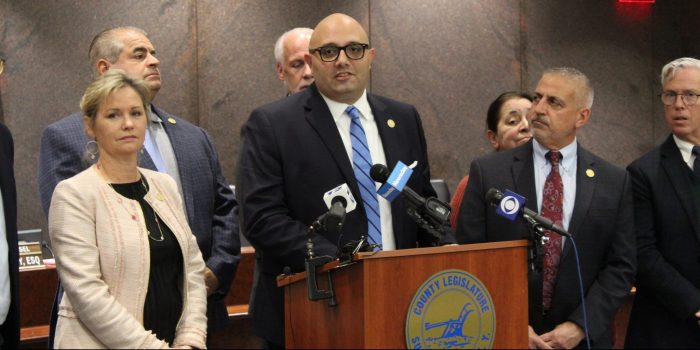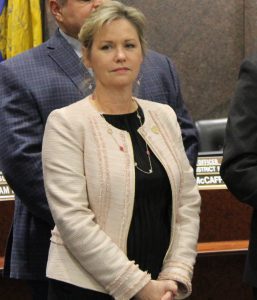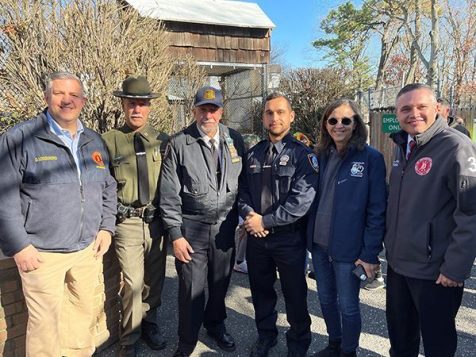“No matter how long it may take us to overcome this premeditated invasion, the American people in their righteous might will win through to absolute victory.”
— President Franklin D. Roosevelt (D), Dec. 7, 1941
This week, 81 years ago, the United States was thrust into the global conflict of World War II.
Isolationist tendencies had kept the country out of the war during its earliest years. Prominent Americans such as Charles Lindbergh and Joseph Kennedy Sr. widely considered the fight outside the United States’ strategic interests.
It was an unsettling moment for the nation as Americans watched Britain and the Soviet Union on the brink of defeat from invading Nazi forces. Meanwhile, the Japanese moved against its neighbors from China to Indonesia, controlling significant parts of the Pacific and Asia.
‘A date which will live in infamy’
Within the early morning of Dec. 7, 1941, American ships on patrol outside Hawaii discovered the periscopes of Japanese submarines. Five of these underwater vessels were stationed near Pearl Harbor, ready to pounce upon American ships attempting to flee the assault. At the same time, Japanese planes departed from aircraft carriers that were 275 miles north of Hawaii.
The government and military never feared an attack by the Japanese against its army and naval bases in Hawaii. They feared a possible assault against the Philippines but never believed Pearl Harbor was a target.
Across this country, from the North Shore of Long Island to Hawaii, American citizens were awakened by the horrifying sounds of news reports of the assault. The Japanese rising sun logo was seen on high-level bombers and torpedo planes that swarmed over the morning skies of this island paradise.
Within moments, a wave of 360 enemy fighter planes produced staggering losses on the American side: Five sunken battleships, three destroyers and almost 200 planes were hit from the air. As the Japanese pulled back after this assault, they understood their plans were not fully achieved. Three American aircraft carriers, untouched by the Japanese, would hold down the fort as America rebuilt its Pacific fleet.
Awakening a sleeping giant
American service members scrambled to survive the aerial onslaught. The attack killed 2,403 U.S. personnel, including 68 civilians. The government later discovered that 40 of these deaths were residents of New York. All of this was overwhelming for the stunned American people, stung by this attack and unprepared for this global war effort.
A relieved British prime minister, Winston Churchill, stated that the American partnership in World War II was the ultimate factor in achieving a two-front victory. The Japanese surprise attack at Pearl Harbor would push 16 million Americans to enlist in the armed forces over the following four years, putting the world back on a path to peace.
In the months after the Pearl Harbor attack, Japan gained one of the largest territorial empires in world history. The island nation’s conquests stretched from the Alaskan Aleutian Islands, toward Australia, into China, through several Pacific island nations and to the doorstep of India.
This empire would quickly unravel, thanks to American efforts in the ensuing years. A three-year “island hopping” campaign would eventually bring massive American military power onto Japan’s home islands.
From 1943-45, Japan absorbed constant blows from air, sea and land, pushing this military regime back into its own territory. The war ended after President Harry S. Truman (D) authorized the use of the atomic bomb, obliterating the Japanese cities of Hiroshima and Nagasaki.
Connecting past to present
For decades after Pearl Harbor, there were groups of veteran survivors of this surprise attack that once numbered 18,000 nationally and 70,000 around the world who could recall this tragic date. Today, fewer than 1,500 Pearl Harbor survivors remain.
Moreover, less than 240,000 World War II veterans are still living. The “greatest generation” passes away at a rate of 234 people daily, according to the VA.
The United States has been pivotal in thwarting Russia’s attempts to overrun Ukraine. Vladimir Putin, the Russian president, had comprehensive plans to conquer Ukraine and then move against his neighbors.
While the Ukrainians deserve credit for carrying out a reversal of fortune against Russian aggression, they have gained tremendous military, economic and political aid from the United States.
As we reflect upon the moments after the attack on Pearl Harbor, we must remember that America has adversaries around the globe. The American response following Pearl Harbor should remind Putin never to underestimate the resolve of the American people, its leadership or its mission to combat tyranny around the globe.
Friends and foes should always understand the historical examples of strength the United States illustrated during that dire moment in our national history.
Remember to thank veterans for their services. Their contributions before and after Pearl Harbor have continually promoted the cause of freedom and security throughout the world.
Rich Acritelli is a history teacher at Rocky Point High School and adjunct professor at Suffolk County Community College. Written in conjunction with Manny Watkins, Matt Liselli, Jake Donovan, Evan Donovan, Colin Singh, Simone Carmody and members of the high school’s History Honor Society.






















